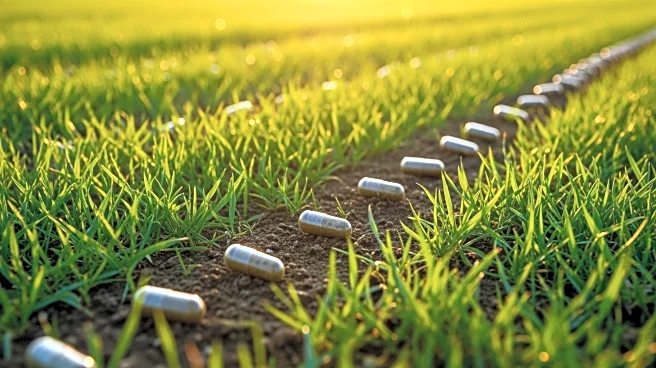What's Happening?
The agricultural inoculants market is projected to grow steadily from 2025 to 2032, with a compound annual growth rate (CAGR) of 0.67%. Agricultural inoculants enhance crop productivity and sustainability
by promoting beneficial microbial activity in soil and plant systems. This market growth is driven by increasing global population, demand for efficient agricultural practices, and a shift towards sustainable farming. Innovations such as biostimulants and precision agriculture are shaping the market landscape. Key players like Bayer, BASF, and Novozymes are investing in research and development to create effective inoculant formulations. Government regulations and support for bio-based products are also contributing to market expansion.
Why It's Important?
The growth of the agricultural inoculants market is significant for the future of sustainable agriculture. As environmental concerns about chemical fertilizers and pesticides rise, inoculants offer a natural solution to enhance soil fertility and crop yields. This shift towards sustainable practices is crucial for meeting future food demands and fostering economic development within the agricultural sector. The adoption of inoculants can lead to improved soil health and nutrient availability, benefiting farmers and consumers alike. The market's expansion reflects a broader trend towards environmentally friendly agricultural solutions.
What's Next?
The agricultural inoculants market is expected to continue evolving with advancements in biotechnology and increased awareness of sustainable practices. As farmers adopt these technologies to address environmental challenges, the market will likely see further growth. Companies may focus on developing enhanced inoculant formulations and integrating them with biostimulants for improved plant health and productivity. Government support and regulations promoting bio-based products will also play a role in driving market expansion.
Beyond the Headlines
The rise of agricultural inoculants represents a shift towards more sustainable and organic farming practices. This trend is driven by consumer demand for healthier food options and environmental concerns. As the market evolves, it may lead to long-term changes in agricultural practices, promoting a more sustainable and efficient food production system. The integration of digital tools and precision agriculture technologies will further enhance the application and effectiveness of inoculants.









